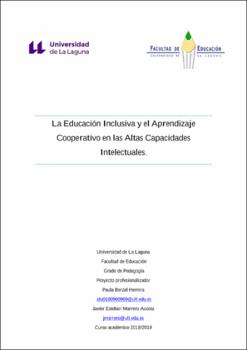La educación inclusiva y el aprendizaje cooperativo en las altas capacidades intelectuales
Author
Berzal Herrera, PaulaDate
2019Abstract
Es objeto del presente Trabajo de Fin de Grado analizar las denominadas Altas
Capacidades Intelectuales desde la óptica de la Educación Inclusiva y el Aprendizaje
Cooperativo, analizando su historia y evolución, los diversos tipos existentes,
características, identificación, metodologías aplicables, etc. Se realiza, al efecto, un
análisis de las características de los alumnos/-as con altas capacidades. Además, se hace
un estudio de cómo ha ido evolucionando esta materia a nivel legislativo y en el orden
jurídico autonómico, centrándonos en la normativa vigente para la Comunidad Autónoma
de Canarias. De la misma manera se valora en este trabajo la Educación Inclusiva y el
Aprendizaje Cooperativo, y la implementación de estas materias y su armonización con
las Altas Capacidades Intelectuales, objetivos a conseguir, metodología del trabajo,
propuestas a realizar y evaluación de resultados. Las altas capacidades intelectuales se
proponen aludiendo a varios aspectos, entre ellos, se define el término, se aportan
características de los alumnos/-as dotados de estos dones y talentos, se indican
alternativas de intervención en las aulas, destacándose la necesidad de una adecuada
formación docente (enriquecimiento curricular) y la colaboración de la escuela-familia,
con especial mención a los procedimientos y técnicas de evaluación de los estudiantes
con necesidades educativas especiales (NEAE). The object of the present End of Degree Project is to analyze the High Intellectual
Capabilities of the perspective of Inclusive Education and Cooperative Learning,
investigating its history and evolution, the different current types, characteristics,
identification, methodologies, evaluation of processes, etc. An analysis of the
characteristics of students with high abilities is carried out. In addition, there is a study of
how this matter has evolved at the legislative level and in the regional legal order,
centered on the current regulations for the Autonomous Community of the Canary
Islands. In the same way, Inclusive Education and Cooperative Learning is valued in this
work, and the implementation of these subjects and their harmonization with the High
Intellectual Abilities, objectives to be obtained, work methodology, proposals to carry out
and evaluation of results. The high intellectual capacities are proposed by referring to
several aspects, among them, the term is defined, characteristics of the students endowed
with these gifts and talents are provided, intervention alternatives are indicated in the
classrooms, highlighting the need for an adequate training teaching (curriculum enrichment) and school-family collaboration, with specialization in the procedures and
evaluation techniques of students with special educational needs (NEAE).





